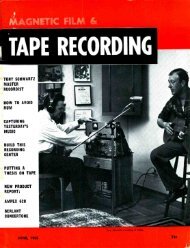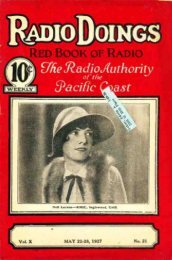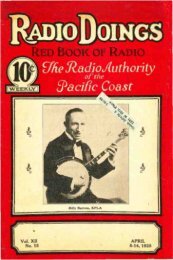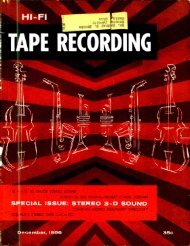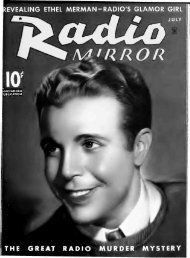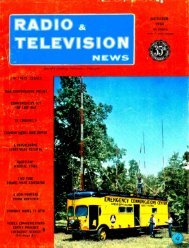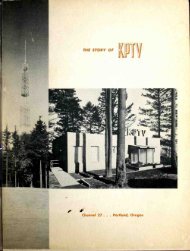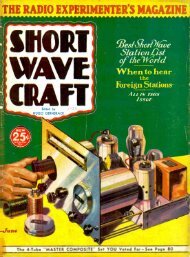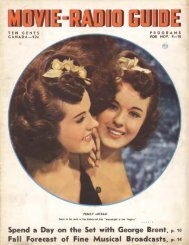Aug - AmericanRadioHistory.Com
Aug - AmericanRadioHistory.Com
Aug - AmericanRadioHistory.Com
You also want an ePaper? Increase the reach of your titles
YUMPU automatically turns print PDFs into web optimized ePapers that Google loves.
RECORDS<br />
Continued from page 54<br />
Paul Ulanowsky is probably the finest of<br />
the accompanists heard regularly with<br />
singers in New York's Town Hall during<br />
the season, and for fourteen years he<br />
toured with Lotte Lehmann.<br />
His accom-<br />
paniments here should prove of inestimable<br />
value to students of singing, since his own<br />
superlative phrasing and timing can force<br />
them when they sing with this record into<br />
some musicianly phrasing on their part.<br />
The budding accompanist should profit<br />
from hearing the unencumbered piano<br />
parts and - from trying to sing the songs<br />
with Mr. Ulanowsky - should learn where<br />
and how singers are dependent on what the<br />
accompanist does. The songs are played in<br />
the original keys - which is almost always<br />
in the soprano register. Fair sound, with<br />
the piano tone not the roundest. It will do<br />
under the circumstances. R. E.<br />
MUSIC ON TAPE<br />
by C. G. Burke<br />
BEETHOVEN<br />
Sonatas for Piano: No. 8, in C Minor,<br />
"Pathétique," Op. 13; No. 14, in C-<br />
sharp minor, "Moonlight," Op. 27,<br />
No. 2<br />
Bernard Vitebsky.<br />
OMEGATAPE 6oto. 5 -in. 71 ips. 2 tracks.<br />
$6.45 -<br />
It is not possible for a critic to feel enthusiasm<br />
for new manifestations of this music,<br />
of which there is already an aggregate of<br />
thirty recordings. These are standard performances,<br />
and the piano issues a sound of<br />
good realism a little light in the bass,<br />
probably a faithful reflection of the performing<br />
left hand.<br />
BEETHOVEN<br />
Symphony No. 5, in C minor, Op. 67<br />
Tonhalle Orchestra, Zurich, Otto Acker -<br />
mann, cond.<br />
MUSIKON 604. 7 -in. 71/2 ips. r track. $to.<br />
The confidence which promoted an issuance<br />
of the Fifth Symphony on tape, braving<br />
comparison with nineteen discal editions<br />
including one binaural and several orchestrally<br />
imposing, a confidence not without<br />
an upstart's effrontery, proclaims its justification<br />
in the opening minutes of reproduction.<br />
In downright sonic effectiveness this<br />
tape is excelled only by the Cook binaural<br />
record of a performance less convincing<br />
than most. Fundamentally what impresses<br />
on the tape is its strong, pervasive, clean<br />
and natural bass, which carries life with it.<br />
The rest is good but not remarkable. There<br />
is a little too much length of reverberation,<br />
and the interpretation, although not to be<br />
despised, is on the stocky side and not<br />
illuminating. A brave and successful demonstration<br />
of 7.5 -ips effectiveness in standard<br />
music.<br />
GRIEG<br />
Concerto for Piano and Orchestra, in A<br />
minor, Op. r6<br />
Grant Johannesen; Netherlands Philharmonic<br />
Orchestra, Walter Goehr, cond.<br />
MUSIKON 6o1. 7 -in. 71/2 ips. t track. $to.<br />
An estimable product from all points of<br />
view, especially vivid in the playing and<br />
sound of the piano. The pianist transmits<br />
a spirit of good- humored entertainment in<br />
his display passages, which are brilliant<br />
enough but not serious. Since this is an<br />
imaginative and valuable concerto although<br />
it needs a rest, novelty of a tasteful sort is<br />
welcome. The long lyricism of the adagio<br />
is treated with respect, and the ca- ordination<br />
of piano and orchestra is notable in both<br />
shape and balance. Registration of the<br />
piano treble has been accomplished with a<br />
clean clarity still very rare in recordings.<br />
HAYDN<br />
Concerto for Piano and Orchestra, in C;<br />
Poco Adagio Cantabile from the "Emperor"<br />
Quartet, Op. 76, No. 3<br />
}Bach: Suite No. 3, in D<br />
[Corelli: Suite for Strings<br />
Hamburg Philharmonia Orchestra, Hans<br />
Juergen -Walther, cond. (with Sandra<br />
Bianca in the Concerto).<br />
AV r029 -E. 7 -in. 71/2 ips. 2 tracks.<br />
$10.95.<br />
The very early Haydn, winsome but frail,<br />
is a first recording, and we shall all regret<br />
that it was not entrusted to hands less dutifully<br />
devoted to tidiness. This virtue seems<br />
to take exclusive precedence in the work of<br />
the conductor here, and the pianist has<br />
been infected by his promotion of it. The<br />
other extensive work, the lively suite by<br />
Bach, is equally deficient in variety, élan<br />
and a sense of sport. The Corelli, best<br />
Otto Ackermann: best Beethoven on tape?<br />
played of the music on this crowded tape,<br />
is a synthetic collection occasionally heard<br />
in public concert, and a pleasant amalgam<br />
of dignity and spoofing. Facile reproduction<br />
and agreeable, although not notable in<br />
articulation.<br />
KODALY<br />
Summer Evening<br />
[Prokofiev: A Summer Day, Op. 656<br />
Concert Artist Orchestra of London, Mervyn<br />
Vicars, cond.<br />
OMEGATAPE 7005. 5 -in. 71/2 ips. 2<br />
tracks. $6.95.<br />
The placement of the orchestra and a<br />
slighted reverberation give a chamber music<br />
quality to these timely evocations of<br />
mood in season. Both pieces -which comprise<br />
an unusually appropriate coupling, for<br />
tape or disk - are played with unforced<br />
sympathy contained by a restraint in accordance<br />
with the benignity of a holiday<br />
summer. With interpretations so conceived,<br />
the sound, allowing crispness and<br />
scope to the woodwinds and keeping the<br />
smooth strings in subordination, cannot be<br />
faulted. - The Prokofiev Suite, composed<br />
for piano, has its first orchestral recording<br />
here.<br />
MENDELSSOHN<br />
A Midsummer Night's Dream: 4 excerpts<br />
tTchaikovsky: Nutcracker Suite No. r;<br />
Sleeping Beauty: Waltz<br />
Hamburg Philharmonia Orchestra, Hans<br />
Juergen -Walther, cond.<br />
AV ro32 -E. 7 -in. 71 ips. 2 tracks.<br />
$10.95.<br />
AV 1032 -F. 5 -in. 33/4 ips. 2 tracks. $8.95.<br />
The Overture, Scherzo, Nocturne, and Wedding<br />
March from the MSND, gentlemanly<br />
to surfeit. The favorite composer of Victoria<br />
RI needs a conductor to dishevel him.<br />
The Tchaikovsky too is content in a tranquillity<br />
which may not content us. The<br />
regularity of balanced play, commendable<br />
in itself, could be welcomed in other music.<br />
-The sound is excellent in the cool way<br />
which is really the way of the conductor,<br />
with the brass precise but subdued, the<br />
strings smooth and the wood lively, all in<br />
balance.<br />
With some diminution of treble brightness<br />
and bass articulation, the 33/4 version<br />
is nevertheless surprisingly good. It is<br />
above all easy and euphonious, the faster<br />
tape heard at a greater distance, and the<br />
difference not to be exposed except by first -<br />
class apparatus.<br />
SCHUBERT<br />
Quartet No. ro, in E -fiat, Op. 125, No. r<br />
tHaydn: Quartet No. r8, in F, Op. 3,<br />
No. 5<br />
tMendelssohn: Octet in E -flat, Op. 2o;<br />
Quintet in B -fiat, Op. 87- Andante<br />
Scherzando only<br />
Fine Arts Quartet (augmented for the<br />
Octet and Quintet).<br />
WEBCOR 2923 -5. 7 -in. 71/2 ips. 2 tracks.<br />
String quartets on tape are easier in reproduction<br />
than on disks. The violins are<br />
orderly, and there is no sense of strain. The<br />
acoustics of the place used for recording<br />
generally determine the quality of registration<br />
on tape, when small groups of players<br />
are used. The environment here is sonically<br />
close to neutrality and the results are excellent.<br />
So is the playing of the Schubert,<br />
to which the musicians have devoted delineative<br />
care not apparent in their bare treatment<br />
of the Haydn. The Octet, not deficient<br />
in energy or skill, nevertheless disappoints<br />
vaguely in a delivery that never seems<br />
pointed to a culmination. (Here it is admitted<br />
that the Toscanini performance, still<br />
vivid in mind, has been prejudicial to this<br />
new tape or any other performance.)<br />
AUGUST 1955 57





